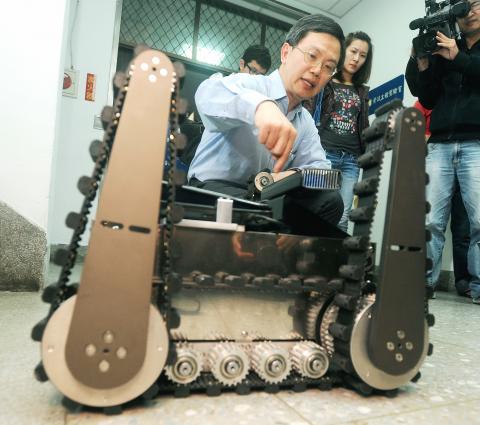A research team from National Taiwan Normal University (NTNU) has invented a robot that can carry out automated nighttime surveillance, climb stairs and move freely around buildings, the team announced yesterday.
The team was comprised of researchers from the school’s Computational Intelligence and Robotics Lab and led by Wang Wei-yen (王偉彥), a chair professor in the Department of Applied Electronics Technology.
It took the team three years to develop the robot, named “NTNU-CIR-I,” which is capable of carrying out surveillance patrols in complicated landscapes during the day and at night.

Photo: Lin Cheng-kung, Taipei Times
The team said the robot was meant to fill the gap in the security of school campuses that are open to the public after class hours. The robot can patrol areas that are not patrolled so often by campus security and that the scope of mounted surveillance cameras cannot reach.
Many other robots rely on four wheels to move and are thereby limited to flat surfaces, but the NTNU-CIR-I was designed to overcome this limitation by employing highly sensitive sensors to detect and navigate past obstacles, even in the dark, Wang said, adding that it can also calculate the angles of slopes or stairs to adjust its movements as it climbs.
The team said they think the robot could be a useful addition to security systems in factories, buildings and campuses because it can transmit real-time footage through the Internet.
It could also be used for educational purposes, such as though the application of its sensors, motor control, image processing and intelligence algorithm design, the team added.
Wang was awarded the titles of Institute of Electrical and Electronics Engineers Fellow and Institution of Engineering and Technology Fellow this year for his contribution to the field of robotics, the school said, adding that the team is applying for a patent for the robot.

‘DENIAL DEFENSE’: The US would increase its military presence with uncrewed ships, and submarines, while boosting defense in the Indo-Pacific, a Pete Hegseth memo said The US is reorienting its military strategy to focus primarily on deterring a potential Chinese invasion of Taiwan, a memo signed by US Secretary of Defense Pete Hegseth showed. The memo also called on Taiwan to increase its defense spending. The document, known as the “Interim National Defense Strategic Guidance,” was distributed this month and detailed the national defense plans of US President Donald Trump’s administration, an article in the Washington Post said on Saturday. It outlines how the US can prepare for a potential war with China and defend itself from threats in the “near abroad,” including Greenland and the Panama

A magnitude 4.9 earthquake struck off Tainan at 11:47am today, the Central Weather Administration (CWA) said. The hypocenter was 32.3km northeast of Tainan City Hall at a depth of 7.3km, CWA data showed. The intensity of the quake, which gauges the actual effect of a seismic event, measured 4 in Tainan and Chiayi County on Taiwan's seven-tier intensity scale, the data showed. The quake had an intensity of 3 in Chiayi City and County, and Yunlin County, while it was measured as 2 in Kaohsiung, Nantou County, Changhua County, Taitung County and offshore Penghu County, the data showed. There were no immediate reports of

The Chinese Nationalist Party (KMT) is maintaining close ties with Beijing, the Democratic Progressive Party (DPP) said yesterday, hours after a new round of Chinese military drills in the Taiwan Strait began. Political parties in a democracy have a responsibility to be loyal to the nation and defend its sovereignty, DPP spokesman Justin Wu (吳崢) told a news conference in Taipei. His comments came hours after Beijing announced via Chinese state media that the Chinese People’s Liberation Army’s Eastern Theater Command was holding large-scale drills simulating a multi-pronged attack on Taiwan. Contrary to the KMT’s claims that it is staunchly anti-communist, KMT Deputy

RESPONSE: The government would investigate incidents of Taiwanese entertainers in China promoting CCP propaganda online in contravention of the law, the source said Taiwanese entertainers living in China who are found to have contravened cross-strait regulations or collaborated with the Chinese Communist Party (CCP) could be subject to fines, a source said on Sunday. Several Taiwanese entertainers have posted on the social media platform Sina Weibo saying that Taiwan “must be returned” to China, and sharing news articles from Chinese state media. In response, the Mainland Affairs Council (MAC) has asked the Ministry of Culture to investigate whether the entertainers had contravened any laws, and asked for them to be questioned upon their return to Taiwan, an official familiar with the matter said. To curb repeated